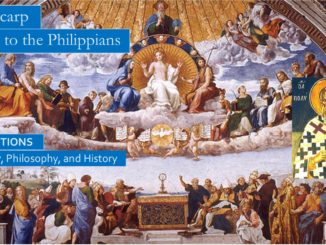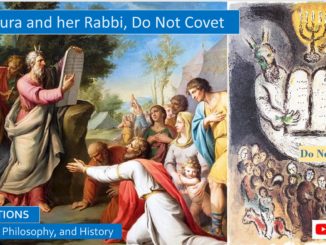
We explore how eager Elohim is to bless sinful lives, we find where Elohim commands husbands to bring joy to their wives.
Before we proceed with our study of the 613 Mitzvoth we must deal with the objection from the blackened souls of men deluded by seduction, that divorce is okay because the Torah permits it. To say the Torah permits divorce does not mean that the Torah condones divorce. Instead, divorce is barely tolerated by the Torah, with great reluctance, and with even greater reluctance by the rabbis. The Mitzvoth in the Torah strain to protect the fates of the unfortunate wives involved, who were far more helpless in biblical times than now.
Prior blog: The Decalogue in the Torah, Blog 2, How One Sin Can Lead to Many More, Up to a Perfect 10
http://www.seekingvirtueandwisdom.com/the-decalogue-in-the-torah-blog-2-how-one-sin-can-lead-to-many-more-up-to-a-perfect-10/
Divorce is not the only intimate sin not explicitly prohibited in the 613 Mitzvoth. Neither is there an explicit prohibition against prostitution or intimacy for hire. So if we claim that divorce is okay because it is not explicitly prohibited in the 613 Mitzvoth, we are compelled to permit prostitution as well.
There are some biblical references that seem to ban prostitution explicitly, but on further examination fall just short of an explicit ban. In Genesis 38:24 Judah ordered Tamarah to be burned, only to relent when discovering he was more in the wrong. Rashi comments that she legally should not be burned by a literal interpretation of the Torah because she was not betrothed. Rashi says the court initially ordered her burned to discourage promiscuity, not harlotry specifically. Also, Leviticus 19:29 prohibits profaning your daughter, to make her a harlot, which of course does not refer to going into someone else’s daughter. Rashi interprets this verse not as forbidding pimping, but rather “to one who gives his unmarried daughter (to a man) without the intention of betrothal.” Ramban disagrees in part. He states that Rashi defines a harlot as a “woman who has intercourse with a man who is forbidden to her,” which is a broader definition than that of a prostitute. His discussion is interesting, but we will cover these points later in other Mitzvah later. Although these verses show no explicit ban on prostitution, there are multitudes of verses against physical and spiritual harlotry or idolatry, which we will soon review.
Indeed, women will allure men, intentionally or unintentionally, for good purposes or bad. The Torah only tries to ensure this allurement is for good, not for evil.
Indeed you could easily argue that prostitution would be a lesser sin than divorce, if they were a sin. Prostitution is temporary, divorce is permanent, and divorce hurts more people. The consequences of prostitution are far easier to unravel than the consequences of divorce. Divorce is final, prostitution is not.
The Mitzvah permitting divorce reads as follows:
Positive Mitzvah 222.
If a man marries a woman
and consummates with her;
should she not find favor in his eyes
because he found
in her something lecherous,
he is to write for her a document of severance
and place it in her hand
and send her from his home.
Deuteronomy 24:1
The Rashi translation renders the Hebrew as lecherous rather than obnoxious, which makes divorce more difficult to justify. This document of severance is called a “get”.
The rabbis were reluctant to issue a “get”. You had to strictly follow form for the “get” to be valid. Rambam notes that:
Divorce is valid only:
Granted by the husband of his free will,
With a bill of divorcement,
If the purpose of the divorce is to remove her from the house,
And there is a complete severance of relations between them,
And the bill is expressly written,
And the bill is handed to her in its original condition,
And it is indeed handed to her,
And the handing over has witnesses,
But only if it is handed to her as a bill of divorce,
And it is handed over by the husband or his agent.
The form is important to Rambam, because he wants to find a reason, no matter how small, to declare the divorce defective, thereby maybe saving the marriage, or at least not breaking it.
And further, Rambam teaches that “unchastity is the only absolute ground for divorce in the case of a first marriage. Divorce on any other ground is discouraged.” Mere incompatibility is more acceptable for the divorce of a second marriage.
The attitude of the Torah towards divorce can be gleaned from the very words the Torah uses to describe G_d, blessed is He, whose Name is so holy usually it is rendered in the Torah as either Adonoy the merciful, or Elohim the just. Elohim may get angry, but Elohim rarely speaks to judge, it is always Adonoy the merciful who speaks. Elohim the just may visit justice to the third and fourth generations of those who hate Him, but Adonoy the merciful remembers those who Love him for thousands of generations. If Adonoy is so quick to be merciful to us, why should would not be as quick to be merciful to those whose lives we affect, particularly those close to us, our loved ones, our family?
How can we say the Torah condones divorce when the Torah speaks so tenderly of marriage, like a gardener who gently waters and nourishes the tender green shoots of the new growth in his garden?
Positive Mitzvah 214.
When a man marries a new wife,
he is not to be mobilized into the army,
it shall not impose itself over him in any matter;
he shall be free for his home one year
and he shall bring joy to the wife he married.
Deuteronomy 24:5
No argument here, how can the ex-husband and the other woman bring joy to the wife he married? It is no accident that in the listing of the Mitzvah this closely follows the Mitzvah to honor and respect your parents.
Not only should the husband bring joy to the wife he married, but the community is enjoined to make this possible. There are some Sages who believe that the man who marries is absolved from all his sins. Ramban states he should pay no attention to military matters, he should only pay attention to his rejoicing with his wife, and he should obey the Mitzvah:
Positive Mitzvah 212.
Be fruitful and multiply.
Genesis 1:28
This is one Mitzvah that no man truly alive has trouble complying with, so we will not count it against him. Indeed, this is the Mitzvah that makes divorce so problematic.
We could argue that this Mitzvah is not being followed. Rambam quotes the sages that marital bliss is a step towards spiritual bliss. Counting this against him sounds ridiculous, so we won’t.
Does the Torah stipulate that the husband need only bring joy to his wife for one year? How ridiculous! Just as we are to Love Adonoy for all time, so we are to bring joy to our wife forever, or as long as she will allow joy into her life, and even then we should always try lest we stop Loving Adonoy.
As flowers bloom in the fields in the spring, so do the Scriptures bloom with blessings for marital bliss. The Song of Songs sings of the Love of Adonoy for his people Israel, for the love of Solomon for his beloved, for the husband of the wife of his youth.
How can the thought of divorce fester in a man’s soul when he luxuriates among the flowers the field, feeling the gentle rain of a loving wife?[1]
The Decalogue in the Torah, Blog 4, Coveting: The Sin That Leads To Many Other Sins
http://www.seekingvirtueandwisdom.com/the-decalogue-in-the-torah-blog-4-coveting-the-sin-that-leads-to-many-other-sins/
[1] For those works cited that are organized by either Mitzvah or by verses, page references are unnecessary.
All Scripture quotations are from the Metsudah Chumash.
The Metsudah Chumash/Rashi, Five Volume Set, translated and/or annotated by Avrohom Davis, Hachum Kornfeld, and Abraham Walzer, (New York, Metsuda Publications, 1999-2002),
Rambam Maimonides, The Commandments, translated by Rabbi C Chavel, Volume One, Positive Commandments, Volume Two, Negative Commandments (New York: The Soncino Press, 1967)
Ramban Nachmanides, Commentary on the Torah, Five Volume Set, translated and annotated by Rabbi C Chavel (New York: Shilo Publishing House, 1976)
Ronald Eisenberg, The 613 Mitzvot, A Contemporary Guide to the Commandments of Judaism (Rockville, MD: Schreiber Publishing, 2005)
Richard Elliott Friedman, Commentary on the Torah (New York: Harper Collins, 2001)




2 Trackbacks / Pingbacks